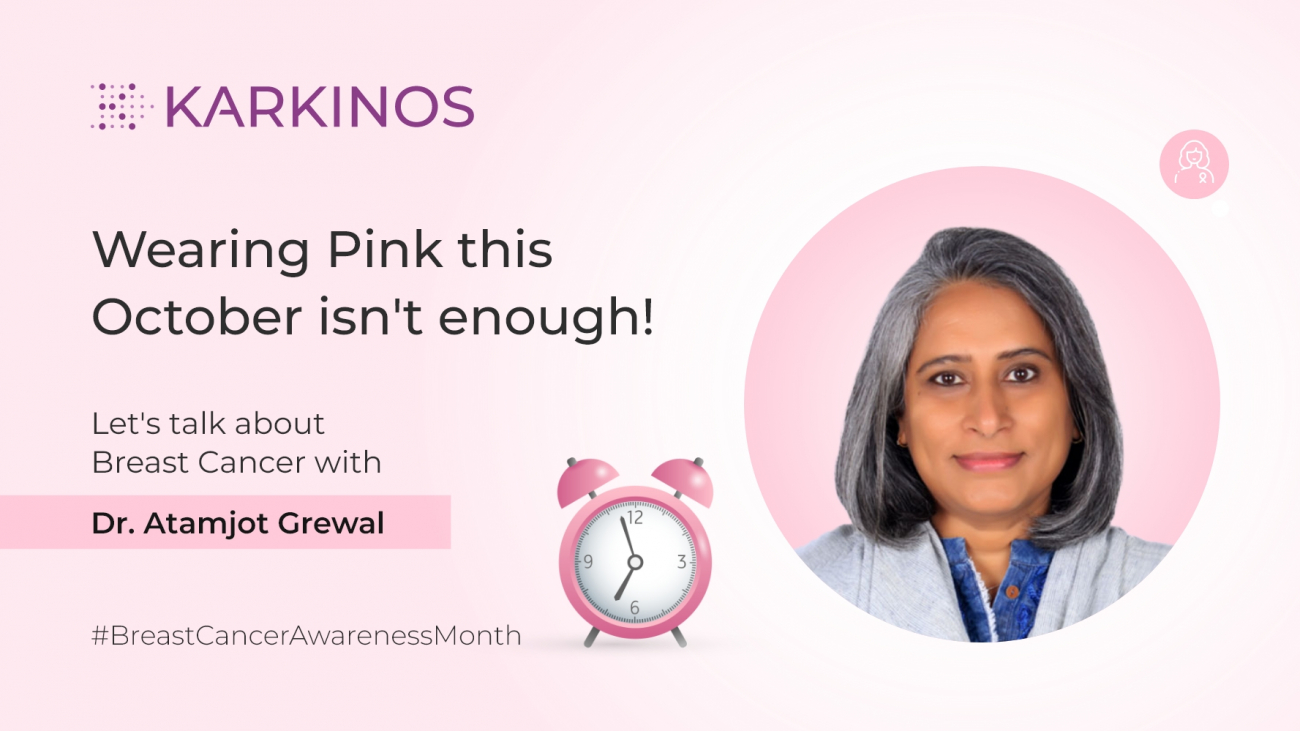How can women guard themselves against breast cancer?
Dr. Atamjot Grewal has the answers
Living in the shadow of memories from battling breast cancer – not easy at all! Is there a way a woman can guard herself from breast cancer? Dr. Atamjot K Grewal, Head of Medical Planning & Patient Experience at Karkinos Healthcare, has a few tips to share from her experience of being early diagnosed with breast cancer, overcoming it successfully, and being actively involved in setting-up facilities to aid in Early Cancer Detection. Excerpts:
Breast cancer is notably the leading cause of death among women, globally. What are your observations about this cancer?
At the end of 2020, there were 7.8 million women alive who were diagnosed with breast cancer in the past 5 years, making it the world’s most prevalent cancer. It can occur in women at any age after puberty but with increasing rates in later life.
The strategies for improving breast cancer outcomes are twofold. First is the fundamental health system strengthening in order to deliver the treatments that are already known to work.
We must establish reliable referral pathways from primary care facilities to district hospitals to dedicated cancer centers. While we initiate this for Breast Cancer, the same approach works for the other cancers and NCDs.
Secondly, public health education to improve awareness of breast exam and benefits of early detection needs to be combined with health worker education about the signs and symptoms of early breast cancer so that women are referred to diagnostic services when appropriate.
As a breast cancer survivor, can you share your experience of being affected by this cancer and having successfully overcome the disease?
Aside from the sense of doom and surreal state that I was overcome with, everything that I have experienced was more psychological than physical. But I must count my blessings for the following: excellent doctors, access to a comprehensive facility and most importantly, EARLY DETECTION.
I was diagnosed with bilateral breast cancer in its early stage during my complete health check. No lump, no discomfort or any other sign or symptom, except for an opacity on the mammogram. The total time from diagnosis to surgery took 10 days. No mutilating surgery, no debilitating radiation or chemotherapy and 94% 5-year survival chance which is amongst the best possible.
I know I will now continue to live in its shadow forever, but I realize that I am better off than most other fellow patients who, unfortunately, get diagnosed in much later stages.
I have been working in the cancer care space for almost 10 years and whilst I wish that no one should get this disease, I want to work towards enabling the same facilities I had for all those who regrettably do end up with cancer.
What is your guidance to women on breast cancer prevention?
Breast feed your children, ensure a good diet, lead an active lifestyle, avoid using oral contraceptives/hormonal IUDs over a decade and be vigilant to any changes or family history. While these are known to reduce breast cancer by about 30%, regular periodic breast check-ups – both manual and through mammograms (along with Pap smears in women) are vital for early detection and better management of this disease.
Access to accurate diagnosis and affordable care plays a major role in the prognosis of breast cancer. What is your take on this? And what do you think India’s healthcare stakeholders should do to make equitable access a possibility?
The greatest opportunities for better health outcomes often come early. Depending upon the disease, getting to the right diagnosis quickly can have outsize effects on health outcomes. This gradual shift from reactive to preventive care in the coming years must be the goal of all stakeholders.
What is your view about breast cancer screening programs? How do you think a woman can benefit from participating in such programs?
Every October, other than the fall colors, there is one other color that you see advertised widely across the social media, by various organizations, governments, and several hospitals – the color Pink! To propagate Breast Cancer Awareness. When diagnosed early and treated before it spreads, the five-year survival rate for breast cancer is 99%. The only way is to inspire awareness, knowledge and encourage lifestyle changes that prioritize cancer prevention and early detection.
Everyone must do more than just wear pink this month…i.e., get themselves screened for breast cancer!
